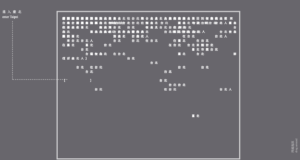Read Haitian Ma’s 问候
I realized that I don’t know how to creatively write in Chinese; this was in junior high. At that time the Chinese exams only permitted writing narrative essays. Whenever required to express emotions, I had to rack every essence of my brain to figure the words out—in which figure of speech, in what combination, and in what order. Through deliberate fitnessing, the words were either abstrusely incomprehensible, or extravagantly dramatic, and instead washed away my initial meanings. Then I went to high school, was permitted to write argumentative essays, and I have never touched the narrative form since then.
I also had never persisted in keeping a diary. Whenever I put my pen to paper, there was always this persisting feeling that some anonymous reader was casting eyes on me, and my diary was in the matter of time to be written for, and to be read by that reader. A reader without a first and last name, completely out of imagination, was calling me out for not being able to write diaries, not being able to write a diary for myself.
Until college, I started to write more in English. Started off with academic essays, slowly, I then gradually picked up writing in free will. As I wrote, and wrote, it was like reuniting with a long-lost mother tongue, with which I became more and more intimate. At some point, it had become the language of my thinking, the language of my self-conversations, and the language of my writings. An intimate relationship of this kind was both adorable and affrighting—was it embracing me, or was it colonizing me.
So to speak, my delightment in translation takes along some personal motives. It is through others’ works in either Chinese-to-English or English-to-Chinese that I am allowed to have a touch on the poetic Chinese; it is through others’ statements that I am able to realize my dream writing in Chinese.
But this dream will always be unachievable. When translating, I need to unhand the entirety of myself, put aside my thoughts, linguistic habits and everything to be thrown away, clean up each and every corner, open the door, and let another voice enter into this world. Living by evaluating her mind, uttering the voice of her meanings, and to let alone her fiddling on the tempers remaining in this empty house, let her squeeze and shrub the frosty and foggy thoughts in the cookstove. I need to care about nothing and be just like her. Waiting for the end of a translation, for the tidied up emotions, for firmly and carefully sending her away; waiting for the ceiling-chairs slowly shifting to the sides of my desk, for the pond-pillows returning to the edges of my bed, for the hanging basket-chopsticks to tip toe back to the cardboards. And waiting for me to open my eyes semi-consciously, when the pen in hand rolls to the ground.
I bend down and pick up the pen, longingly thinking about Chinese, while truthfully writing in English, petrifyingly shilly-shallying in the adversity of a language prison.
So to speak, hearing each and every worker-poem, my heart envies and goes to them. How ingenious are their usages of rhetoric! How concise are the sentences! In such short lines of text there is so much expression of complicated emotions, and that leaves me in the dust from far, far behind.
Just like what its deliberacy carries, in the same way leaving me behind in the midst of dust. I can only vaguely, and from afar gaze at it. Facing those things of a far cry, what rights do I have to speak for others?

